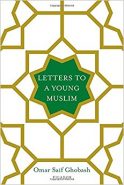
Book Review: Letters to a Young Muslim by Omar Saif Ghobash
Reviewed by Jill Moyer Sunday

Letters to a Young Muslim
Nonfiction by Omar Saif Ghobash
Picador, January 2017
£16.99; 272 pp.
ISBN-13: 978-1509842599
The intersection of fundamentalist Islamic philosophy and the modern world is the focus of this eloquent series of letters from a Muslim father to his teenage son. Through 27 short letters, Omar Saif Ghobash gently entreats his son to think carefully and deeply about the choices before him as a Muslim coming of age in a world fractured by violent ideologies.
Part Islamic history overview, part memoir, part philosophical treatise, part father love, Letters to a Young Muslim repeatedly calls for clear-headed critical thinking instead of strict adherence to ideas formed in the 8th and 9th centuries when Islam was under continuous physical attack. The author links the growth of ISIS and other fundamentalist groups to an archaic, limited view of life, one “based less on texts and more on a belief that Islam is about rules and punishments.” Ghobash, United Arab Emirates Ambassador to Russia, cautions against the black-or-white conduct code espoused by Islamic extremists, a philosophy born centuries ago in an unforgiving desert environment, one in which things are either haram (prohibited) or halal (allowed). Rejecting this binary approach, Ghobash pushes his son toward the gray area:
And the gray is where you develop intellectually and morally. The gray area of uncertainty and doubt as to what is right and what is wrong is where you discover your own right to think for yourself and to participate in the construction of our ethical world in practice.
Throughout the book, Ghobash advocates reading widely, examining different religions’ theologies, exploring the great works of philosophy, becoming familiar with (and perhaps creating) powerful literature. “You can choose to be locked into a particular world,” he tells his son, “or you can set forth into a world of human experience.”
Letters to a Young Muslim ends with a call to action. The author asks his son to take responsibility for how Islam evolves in the modern world, to “grab hold of the responsibility of peace,” to look out for those living on the margins, to question ideas, and to “keep an eye out for where goodness really abides.”
While this primer for living as a socially and religiously responsible human being is directed toward the author’s son, the cautions and advice here are poignantly relevant for all of us in the post-truth era. Letters to a Young Muslim invites us to consider our individual impact on the world. As Ghobash reminds his son, “When you do not take responsibility, the world spins out of control.”
Jill Moyer Sunday is a former journalist who teaches writing and literature at Waynesburg University. Her creative nonfiction can be found in the Anthology of Appalachian Writers, Connotation Press, JAEPL, The New Delta Review, and WOE.

Leave a Reply